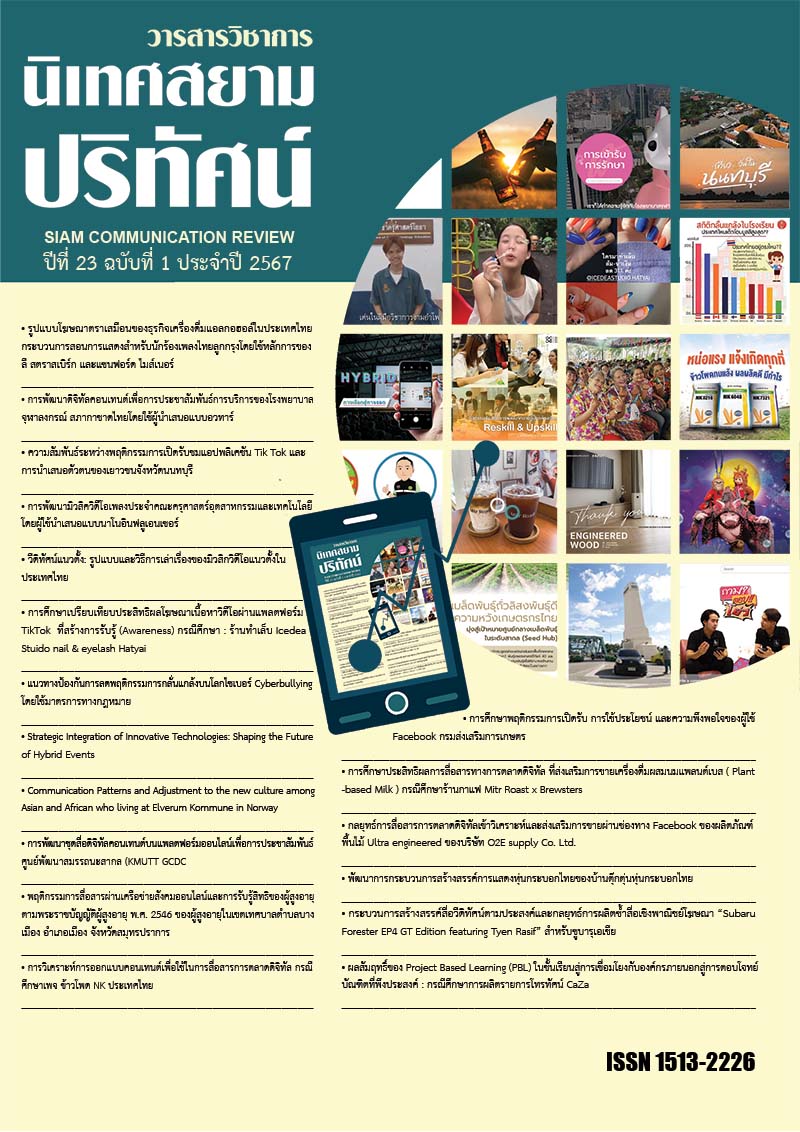ผลสัมฤทธิ์ของ Project Based Learning (PBL) ในชั้นเรียนสู่การเชื่อมโยงกับองค์กรภายนอก สู่การตอบโจทย์บัณฑิตที่พึงประสงค์ : กรณีศึกษาการผลิตรายการโทรทัศน์ CaZa
Main Article Content
บทคัดย่อ
ผลสัมฤทธิ์ของ Project Based Learning (PBL) ในชั้นเรียนสู่การเชื่อมโยงกับองค์กรภายนอก สู่การตอบโจทย์บัณฑิตที่พึงประสงค์ : กรณีศึกษาการผลิตรายการโทรทัศน์ CaZa เป็นบทความวิชาการที่มีวัตถุประสงค์เพื่อถอดบทเรียนจากโครงงานการผลิตรายการโทรทัศน์ของนักศึกษา ซึ่งเป็นความร่วมมือระหว่างคณะนิเทศศาสตร์ มหาวิทยาลัยเกษมบัณฑิต กับสำนักงานกองทุนสนับสนุนการเสริมสร้างสุขภาพ (สสส.) ในการผลิตรายการเพื่อส่งเสริมสุขภาวะ ส่งเสริมความสามารถทางกาย จิตใจ และสุขภาพทางสังคม และส่งเสริมปัญญารู้รอบรู้เท่าทัน ซึ่งเป็นปัจจัยพื้นฐานทางสังคมอย่างสงบสุข และมีสันติภาพ ภายใต้แนวคิดรายการสาระบันเทิงที่นำเสนอข้อมูลสารเสพติด หรือสิ่งไม่ดี สิ่งที่อันตราย อันเป็นปัจจัยเสี่ยงในชีวิตสำหรับกลุ่มเป้าหมาย นำเสนอในรูปแบบรายการสาระบันเทิงให้เกิดความสนุกสนานที่หลากหลาย พร้อมสอดแทรกสาระให้ตระหนักถึงพิษภัย ชี้แนะให้เกิดการปรับพฤติกรรม รวมทั้งนำเสนอกิจกรรมสร้างสรรค์อื่นๆ เพื่อให้กลุ่มเป้าหมายซึ่งเป็นวัยรุ่นห่างไกลจากสิ่งที่เป็นภัยร้าย โดยคณะดำเนินงานได้นำแนวทางการจัดการเรียนรู้บรรณาการโดยใช้โครงงานการแบบบูรณาการผลิตรายการโทรทัศน์ CaZa เป็นฐานในการพัฒนาผลสัมฤทธิ์ทางการเรียนให้กับนักศึกษาระดับปริญญาตรี โดยรายการมีความยาว 15 นาที นำเสนอจำนวน 10 ตอน เผยแพร่ผ่านสื่อออนไลน์ Youtube Channel : Cable Channel 37HD และสื่อสาธารณะเคเบิ้ลทีวี Cable Channel 37HD สถานีเพื่อนสนิท เพื่อสุขภาวะ ภายใต้การกำกับดูแลของสำนักงานกองทุนสนับสนุนการเสริมสร้างสุขภาพ (สสส.)
ผลสัมฤทธิ์จากการเรียนรู้โดยใช้โครงงานผลิตรายการโทรทัศน์ CaZa นับเป็นการพัฒนางานทั้งในด้านผลงาน (รายการโทรทัศน์) ด้านทักษะการเรียนรู้และการคิด (Learning and Thinking Skill) ที่นักศึกษาได้รับมี ดังนี้ 1) ทักษะการคิดเชิงประเด็น 2) ทักษะการคิดเชื่อมโยง 3) ทักษะการคิดเชิงวิเคราะห์ 4) ทักษะการคิดเชิงวิพากษ์ 5) ทักษะการคิดสร้างสรรค์ 6) ความสามารถในการเรียนรู้งานได้อย่างรวดเร็ว 7) มีความสามารถในการจำแนกปัญหา เข้าใจบริบทต่างๆ ที่เกิดขึ้นในสังคม และสามารถนำเสนอออกมาได้อย่างลุ่มลึก 8) นักศึกษาสามารถสร้างองค์ความรู้ รู้ความจำเป็นของปัญหา (conflict resolution) 9) สามารถใช้ศาสตร์ทางนิเทศศาสตร์ชี้นำสังคมในประเด็นที่เหมาสะม และวิธีการแก้ปัญหาการเรียนรู้ การศึกษาวิจัยและพัฒนาความคิดสร้างสรรค์เพื่อเพิ่มคุณค่าและมูลค่าของงาน ด้วยการผสมผสานความรู้ต่างๆ ที่สืบค้นและเรียนรู้ด้วยตนเอง “คุณค่า” ของผลงานในที่นี้ไม่เพียงหมายถึงราคาของผลงานที่นักศึกษาตกผลึกความคิดและสร้างสรรค์ผลิตผลงานออกเผยแพร่เท่านั้น แต่ยังหมายถึง คุณค่าทางอารมณ์” ที่ได้รับจากการประเมินคุณค่าด้วย ซึ่งนักศึกษาสามารถพัฒนาทักษะการเรียนรู้แห่งศตวรรษที่ 21 เช่น ความฉลาดทางสติปัญญา ความฉลาดทางอารมณ์ ความฉลาดทางศีลธรรม และความฉลาดทางสังคม ทักษะการคิดสร้างสรรค์ และเทคนิคการสื่อสารได้อย่างมากมาย นอกจากนี้ความน่าสนใจของการสร้างเครือข่ายความร่วมมือทางการศึกษากับหน่วยงานภายนอก ถือเป็นการหลอมรวมกระบวนการซึ่งอาศัยคุณสมบัติที่มีอยู่โดยธรรมชาติของกระบวนการเรียนการสอนตามความถนัด และการสร้างความร่วมมือในเชิงโครงสร้างระหว่างผู้เรียน ผู้สอน หลักสูตร และหน่วยงานภาคีเครือข่ายความร่วมมือภายนอก ซึ่งมีการสนับสนุนงบประมาณในการผลิตรายการโทรทัศน์ เพื่อขับเคลื่อนกระบวนการอย่างเป็นระบบ
Article Details

อนุญาตภายใต้เงื่อนไข Creative Commons Attribution-NonCommercial-NoDerivatives 4.0 International License.
เอกสารอ้างอิง
กระทรวงศึกษาธิการ. (2562). พระราชบัญญัติการศึกษาแห่งชาติ (ฉบับที่ 4) พ.ศ. 2562. กรุงเทพฯ: กระทรวงศึกษาธิการ.
กุลรภัส เทียมทิพร. “PBL: Project Base Learning การเรียนรู้สู่การปฏิบัติจริงโดยใช้โครงงานเป็นฐาน”. วารสารการจัดการความรู้ พ.ศ.2559 มหาวิทยาลัยราชภัฏนครสวรรค์ (2559): 1-16
คุณครู Code Genius Academy. Project based learning คืออะไร การเรียนรู้ยุคใหม่ในศตวรรษที่ 21 [ออนไลน์]. 2013. เข้าถึงจาก. https://www.codegeniusacademy.com/project-based-learning/ [30 ธันวาคม 2566]
พะเยาว์ ตองแก้ว. (2566). ผลการจัดการเรียนรู้โดยใช้โครงงานเป็นฐานที่มีต่อผลสัมฤทธิ์ทางการเรียน และทักษะความคิดสร้างสรรค์ในรายวิชางานช่างของนักเรียนชั้นมัธยมศึกษาปีที่ 1. วารสารการเพื่อปฏิรูปการเรียนรู้ สถาบันวิจัย พัฒนา และสาธิตการศึกษา มหาวิทยาลัยศรีนคริทรวิโรฒ (2566): ปีที่ 6 ฉบับที่ 2 (กรกฎาคม-ธันวาคม 2566) หน้า 32-46
พิมพันธ์ เดชะคุปต์ และคณะ. (2551). การสอนคิดด้วยโครงงาน : การเรียนการสอนแบบบูรณาการ. กรุงเทพฯ : สำนักพิมพ์แห่งจุฬาลงกรณ์มหาวิทยาลัย.
สุพิน ดิษฐสกุล. (2549). การเรียนรู้ตามแนวคอนสตัคชันนิสต์ด้วยการทำโครงงานที่เน้นการร่วมมือ ร่วมพลังในนวัตกรรมเพื่อการเรียนรู้สำหรับครูยุคปฏิรูปการศึกษา. พิมพันธ์ เดชะคุปต์ ลัดดา ภู่เกียรติ และสุวัฒนา สุวรรณเขตนิคม (บรรณาธิการ) .กรุงเทพฯ : ศูนย์ตำราและ เอกสารทางวิชาการ คณะครุศาสตร์ จุฬาลงกรณ์มหาวิทยาลัย.
สำนักงานคณะกรรมการพัฒนาเศรษฐกิจและสังคมแห่งชาติ. (2561). ยุทธศาสตร์ชาติ พ.ศ. 2561 – 2580. กรุงเทพฯ : สำนักงานคณะกรรมการพัฒนาเศรษฐกิจและสังคมแห่งชาติ.
เอมอร บูชาบุพพาจารย์. (2549). โครงงานวิทยาศาสตร์การเรียนรู้ด้วยตนเอง.ในนวัตกรรมเพื่อการ เรียนรู้สำหรับครูยุคปฏิรูปการศึกษา. พิมพ์พันธ์ เดชะคุปต์ ลัดดา ภู่เกียรติ และสุวัฒนา สุวรรณเขตนิคม (บรรณาธิการ). กรุงเทพฯ : ศูนย์ตำราและเอกสารทางวิชาการ คณะครุศาสตร์ จุฬาลงกรณ์มหาวิทยาลัย.
Coffey, H. (2008). Project-based learning. (online) Retrieved from http://www.learnnc.org/lp/pages/4753
John Larmer, John Mergendoller and Suzie Boss. (2015). Setting The Standard for Project Based Learning, VA USA: ASCD Alexandia.
Pleumsamrankit, P. (2017). Factors Affecting Learners' 21st Century Skills. Journal Valaya Alongkorn Review (Humanities and Social Sciences). 7(3), 141-158.
Tuamsuk, K., Kwiecien, K., and Sarawanawong, J. (2013). A University Library Management
Model for Students' Learning Support. The International Information & Library Review, 45(3–4), 94-107. doi:http://dx.doi.org/10.1016/j.iilr.2013.10.002.


